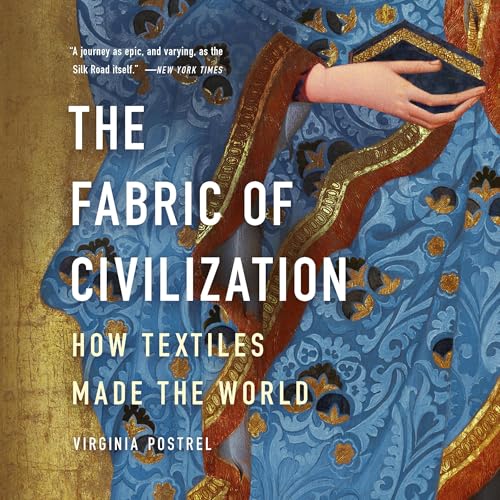
The Fabric of Civilization
How Textiles Made the World
Impossible d'ajouter des articles
Désolé, nous ne sommes pas en mesure d'ajouter l'article car votre panier est déjà plein.
Veuillez réessayer plus tard
Veuillez réessayer plus tard
Échec de l’élimination de la liste d'envies.
Veuillez réessayer plus tard
Impossible de suivre le podcast
Impossible de ne plus suivre le podcast
Accès illimité à notre catalogue à volonté de plus de 10 000 livres audio et podcasts.
Recevez 1 crédit audio par mois à échanger contre le titre de votre choix - ce titre vous appartient.
Gratuit avec l'offre d'essai, ensuite 9,95 €/mois. Possibilité de résilier l'abonnement chaque mois.
Acheter pour 19,35 €
-
Lu par :
-
Caroline Turner Cole
-
De :
-
Virginia Postrel
À propos de ce contenu audio
The story of humanity is the story of textiles―as old as civilization itself. Since the first thread was spun, the need for textiles has driven technology, business, politics, and culture.
In The Fabric of Civilization, Virginia Postrel synthesizes groundbreaking research from archaeology, economics, and science to reveal a surprising history. From Minoans exporting wool colored with precious purple dye to Egypt, to Romans arrayed in costly Chinese silk, the cloth trade paved the crossroads of the ancient world. Textiles funded the Renaissance and the Mughal Empire; they gave us banks and bookkeeping, Michelangelo's David and the Taj Mahal. The cloth business spread the alphabet and arithmetic, propelled chemical research, and taught people to think in binary code.
Assiduously researched and deftly narrated, The Fabric of Civilization tells the story of the world's most influential commodity.

Vous êtes membre Amazon Prime ?
Bénéficiez automatiquement de 2 livres audio offerts.Bonne écoute !
Commentaires
“We are taken on a journey as epic, and varying, as the Silk Road itself...[The Fabric of Civilization is] like a swatch of a Florentine Renaissance brocade: carefully woven, the technique precise, the colors a mix of shade and shine and an accurate representation of the whole cloth.”—New York Times
“Expansive…The author is excellent at highlighting how textiles truly changed the world.”—Wall Street Journal
"My pick as best nonfiction book of the year...[Virginia Postrel] offers a bold retelling of history through an emphasis on cloth—cloth as decoration, cloth as currency, cloth as ritual and much more. One of the most extraordinary volumes I have read in years."—Stephen Carter, Bloomberg Opinion
“Textile-making hasn’t gotten enough credit for its own sophistication, and for all the ways it undergirds human technological innovation—an error Virginia Postrel’s erudite and complete book goes a long way toward correcting at last.”—Wired
“The Fabric of Civilization is a fascinating book, and persuasive too: by the end the case is made that ‘textiles made the world.’”—Times (UK)
"Fascinating and wide-ranging...This is an engrossing and illuminating portrait of the essential role fabric has played in human history."—Publishers Weekly
"From the Stone Age to Silicon Valley, textiles have played a central role in the history of the world. Virginia Postrel has an encyclopedic knowledge of the subject but she imparts it with a touch as light as Penelope's at the loom. Ambitious, erudite, and absorbing, The Fabric of Civilization is both an education and a pleasure to read."—Barry Strauss, author of Ten Caesars
"Virginia Postrel has created a fascinating history of textiles from their Palaeolithic beginnings to the present and future―from the earliest plant fibers plucked from weeds to synthetic fabrics with computer chips in the threads. And why, you say, should we examine mere cloth? Precisely because it fills more and more roles in our lives, yet we take it for granted...Well researched and highly readable, the book is a veritable treat."—Elizabeth Wayland Barber, author of Women's Work
"A fascinating, surprising and beautifully written history of technology, economics, and culture, told through the thread of textiles, humanity's most indispensable artefacts. I loved it."—Matt Ridley, author of How Innovation Works
Aucun commentaire pour le moment









